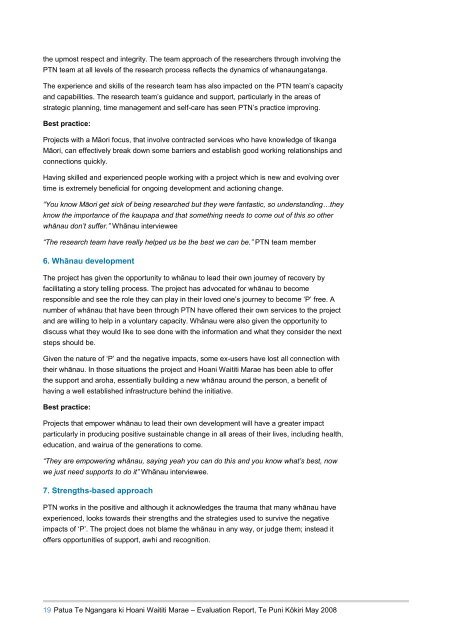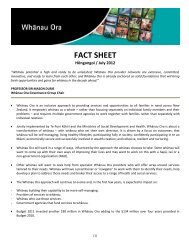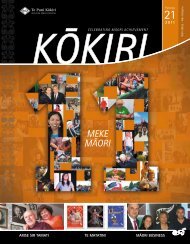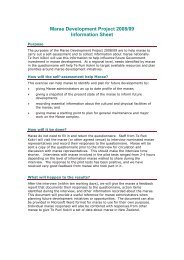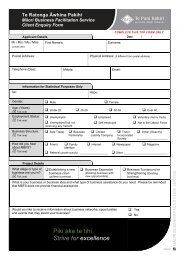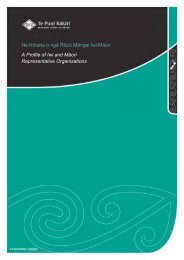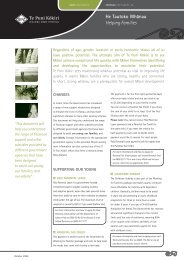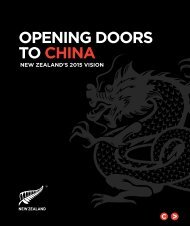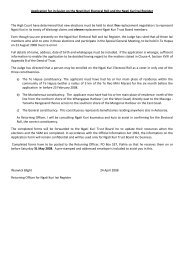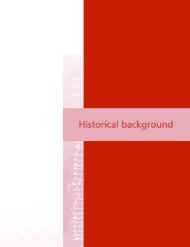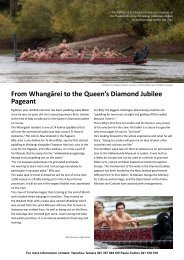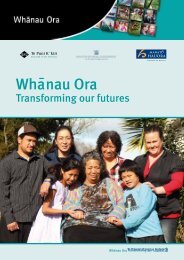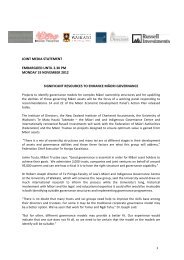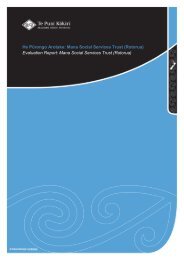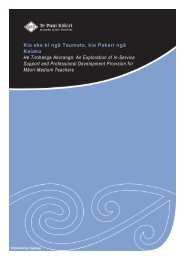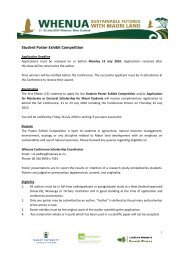Evaluation Report: Hoani Waititi Marae: PDF 1.4MB - Te Puni Kokiri
Evaluation Report: Hoani Waititi Marae: PDF 1.4MB - Te Puni Kokiri
Evaluation Report: Hoani Waititi Marae: PDF 1.4MB - Te Puni Kokiri
You also want an ePaper? Increase the reach of your titles
YUMPU automatically turns print PDFs into web optimized ePapers that Google loves.
the upmost respect and integrity. The team approach of the researchers through involving the<br />
PTN team at all levels of the research process reflects the dynamics of whanaungatanga.<br />
The experience and skills of the research team has also impacted on the PTN team‟s capacity<br />
and capabilities. The research team‟s guidance and support, particularly in the areas of<br />
strategic planning, time management and self-care has seen PTN‟s practice improving.<br />
Best practice:<br />
Projects with a Māori focus, that involve contracted services who have knowledge of tikanga<br />
Māori, can effectively break down some barriers and establish good working relationships and<br />
connections quickly.<br />
Having skilled and experienced people working with a project which is new and evolving over<br />
time is extremely beneficial for ongoing development and actioning change.<br />
“You know Māori get sick of being researched but they were fantastic, so understanding…they<br />
know the importance of the kaupapa and that something needs to come out of this so other<br />
whānau don‟t suffer.” Whānau interviewee<br />
“The research team have really helped us be the best we can be.” PTN team member<br />
6. Whānau development<br />
The project has given the opportunity to whānau to lead their own journey of recovery by<br />
facilitating a story telling process. The project has advocated for whānau to become<br />
responsible and see the role they can play in their loved one‟s journey to become „P‟ free. A<br />
number of whānau that have been through PTN have offered their own services to the project<br />
and are willing to help in a voluntary capacity. Whānau were also given the opportunity to<br />
discuss what they would like to see done with the information and what they consider the next<br />
steps should be.<br />
Given the nature of „P‟ and the negative impacts, some ex-users have lost all connection with<br />
their whānau. In those situations the project and <strong>Hoani</strong> <strong>Waititi</strong> <strong>Marae</strong> has been able to offer<br />
the support and aroha, essentially building a new whānau around the person, a benefit of<br />
having a well established infrastructure behind the initiative.<br />
Best practice:<br />
Projects that empower whānau to lead their own development will have a greater impact<br />
particularly in producing positive sustainable change in all areas of their lives, including health,<br />
education, and wairua of the generations to come.<br />
“They are empowering whānau, saying yeah you can do this and you know what‟s best, now<br />
we just need supports to do it” Whānau interviewee.<br />
7. Strengths-based approach<br />
PTN works in the positive and although it acknowledges the trauma that many whānau have<br />
experienced, looks towards their strengths and the strategies used to survive the negative<br />
impacts of „P‟. The project does not blame the whānau in any way, or judge them; instead it<br />
offers opportunities of support, awhi and recognition.<br />
19 Patua <strong>Te</strong> Ngangara ki <strong>Hoani</strong> <strong>Waititi</strong> <strong>Marae</strong> – <strong>Evaluation</strong> <strong>Report</strong>, <strong>Te</strong> <strong>Puni</strong> Kōkiri May 2008


